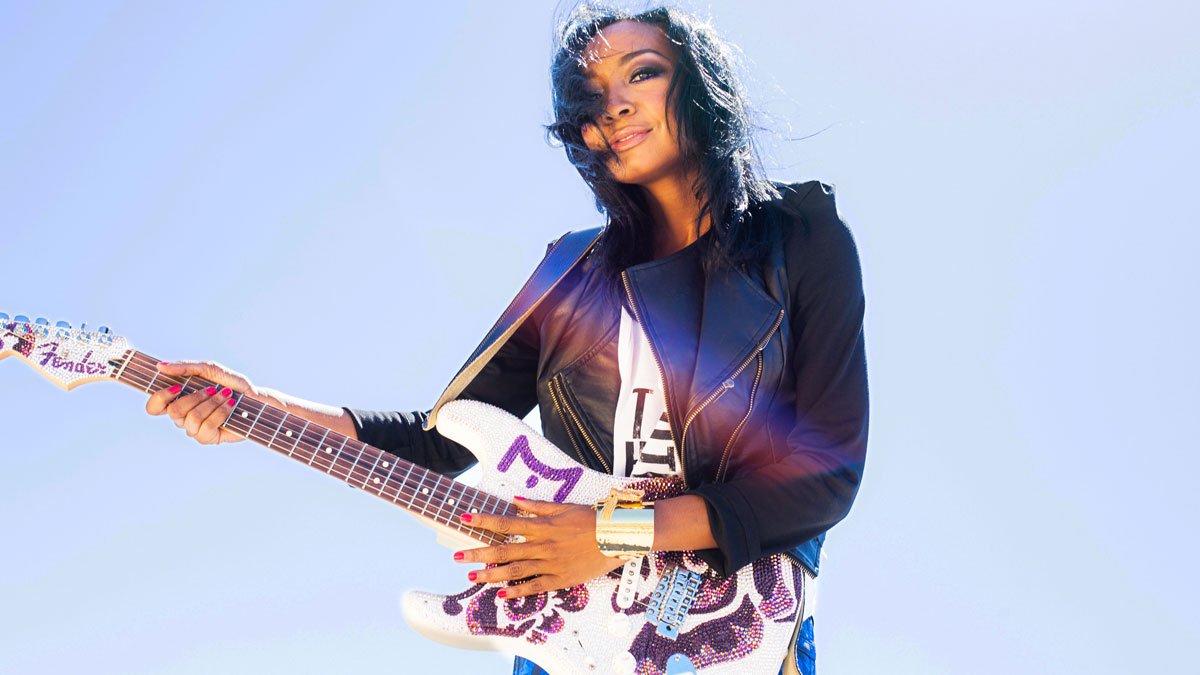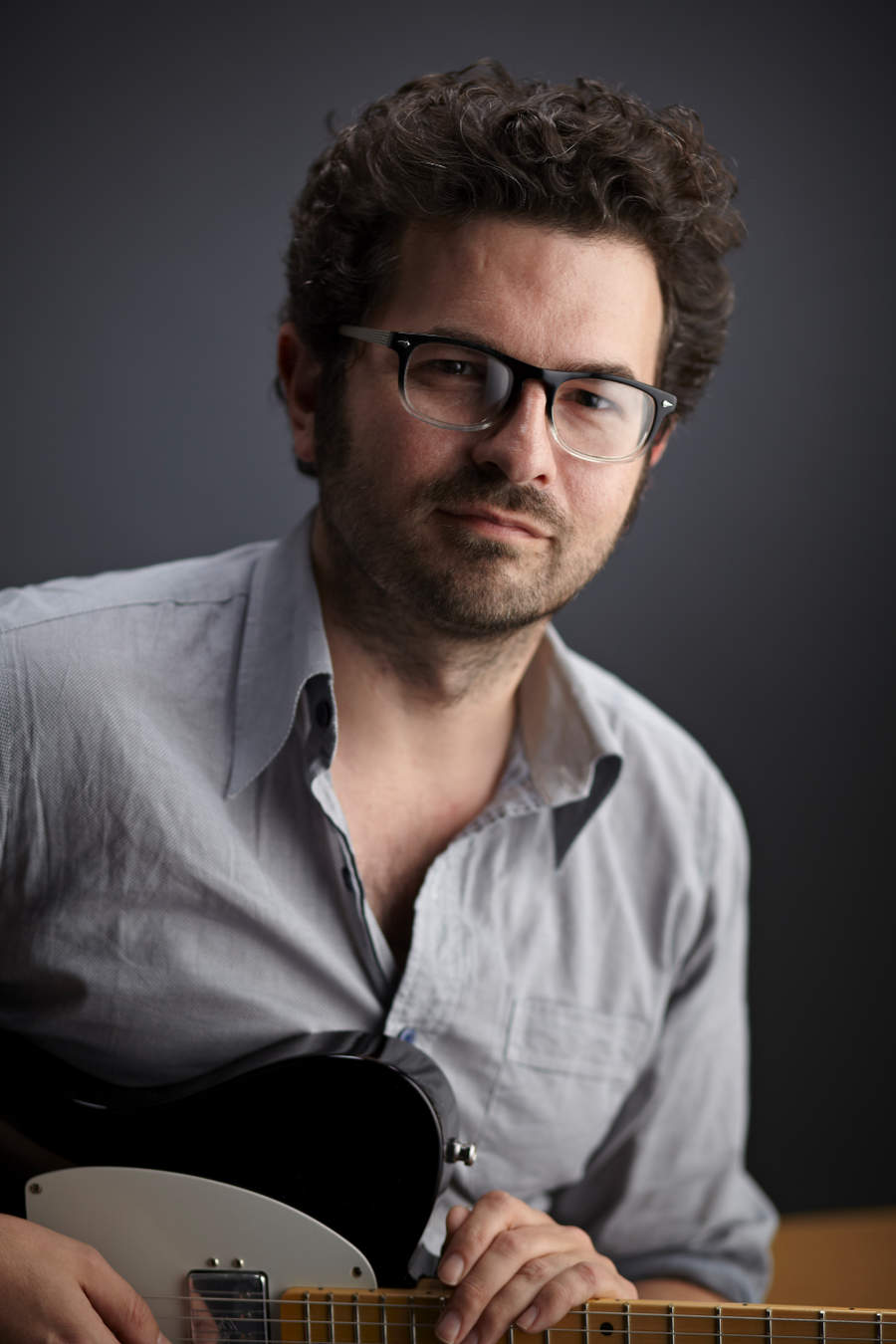Malina Moye: “I’m using my guitar as my weapon to tell you how I feel and give you my perspective”
The soul and blues guitarist on failing, feeling and ‘fifth-gear’ playing
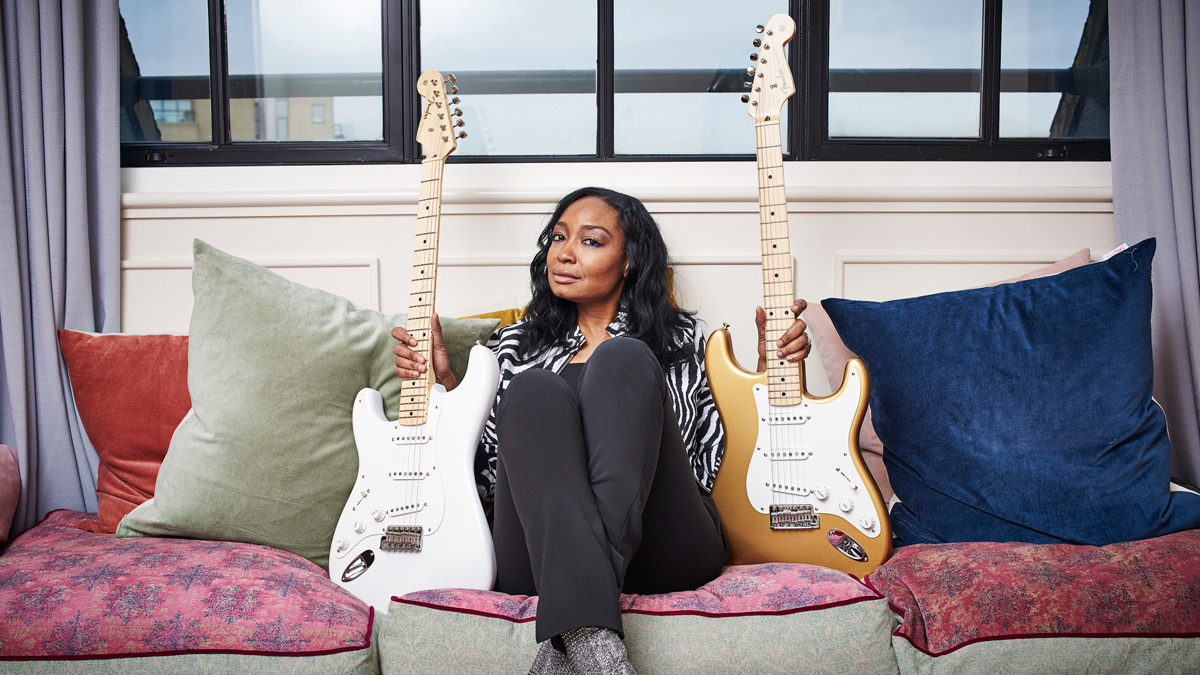
She has been hailed as one of the most powerful guitarists working today by both Carlos Santana and Stevie Wonder. We join Malina Moye to talk about making blues in Trump’s America and how to conquer fear of failure to find guitar greatness beyond...
Given that she’s been on a plane as often than she’s been on terra firma during her whistlestop tour of Europe, jet lag hasn’t dried up Malina Moye’s flow of observations on music, life and, well, just about everything.
She talks as she plays: in cascading ideas that tumble one into the next but which cut to the heart of the matter like an arrow. Today, we’re talking about guitar – the childhood love that blossomed into a career that has seen her lauded by Joe Bonamassa and become the first female guitarist to join the Experience Hendrix Tour alongside Eric Gales, Buddy Guy and other luminaries.
But with the launch of her new album Bad As I Wanna Be, she’s got her own axe to grind – in the best possible sense. We join her to talk about Hendrix’s most important lesson for other guitarists, how to channel grace and feeling into every note, even under pressure, and why DiMarzios are a girl’s best friend...
What was your path into playing guitar?
“My father gave me a right-handed guitar when I was nine. But when he left the room, I flipped it upside down and started playing it backwards, and then I said, ‘Now, this works. This is perfect.’ My dad comes back and he’s, like, ‘Malina, this is backwards. Nobody plays like this’. He’s, like, ‘I don’t even think Jimi is playing it backwards like that [with treble strings uppermost]. He’s, like, you know, playing it another way.’ I just said, ‘Daddy, this works,’ and I just kept playing.
“My dad is a bassist as well as a guitarist, so he showed me what he knew – and then the goal was always to be around players who were better than me. Even now, it’s the same thing, you know? So as you just start to develop a lot of my basis was learning from people. Meaning that instead of going to Berklee and hearing about Buddy Guy, you’re on stage with Buddy Guy, he’s actually showing you what he was doing. So it was, like, sink or swim.
Want all the hottest music and gear news, reviews, deals, features and more, direct to your inbox? Sign up here.
“So a lot of the things that happened for me were definitely on-the-job training. I think that is what helped me to really develop, because Brad Whitford was another one: he told me, ‘When you don’t know the rules, you have to really start thinking outside the box and it helps you to be more creative.’ So for me it’s about the soul and the feel. Looking at BB King and a few other greats… again, it just depends on what you fancy, but I feel like one note can have just as much emotion as 20. It just depends on what you’re bringing to the table.”
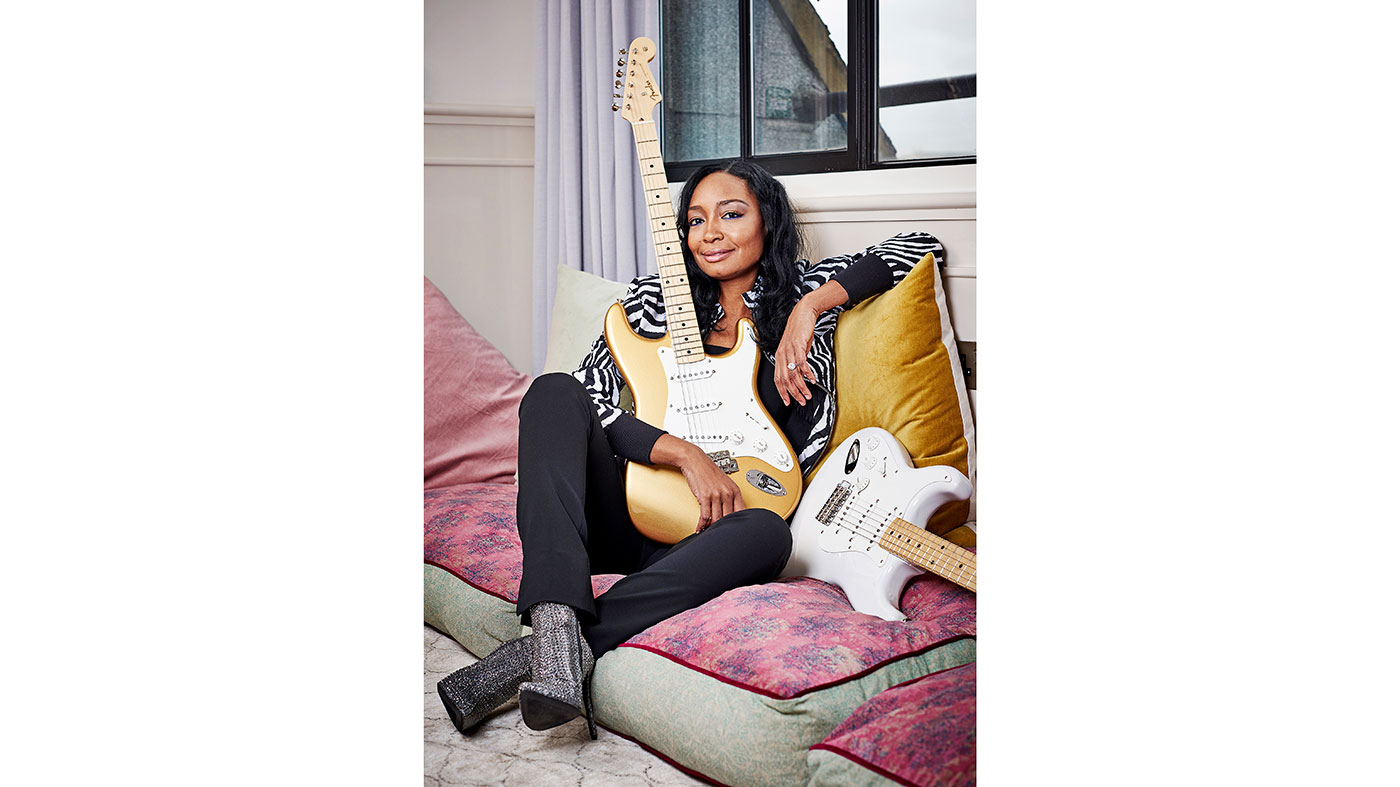
Sinister soloing
Does being a lefty give you a different approach to playing? If so, in what ways?
“Absolutely, completely different. Even today, if there’s something I love, I’m, like, ‘Man, show this to me.’ Normally, what happens is I say, ‘Just play,’ and then my mind has to process what you’re doing because I have to put it in my mind backwards...
The guitar line has to be as powerful as the lead vocal because that is your answer to whatever you’re saying
“Also, the way I play with the high E string on the top means I can’t always hit the low end of chords. So even when you play a 7th, a 9th or an 11th, you can’t tell me how to play it. I’ll just say, ‘Play the chord,’ and my fingers are going to have to find an inversion that works, because we’re doing the same thing, but we’re not.”
So many great blues guitarists are also strong vocalists, like yourself. Is interweaving vocal and guitar lines something you find effective?
“Absolutely, absolutely, because if I can sing the line, then I can play the line. I’m a person who likes to keep melodies extremely simple. I’ll find the minor in any major – I love the pentatonic scale. It’s so soulful, it’s so real. I go back to the word ‘feel’ constantly because that is how you start to pool your emotion, and then that emotion begins to go into your writing. That [kind of] writing needs some kind of response, so here’s your guitar line, then you go to another vocal line. You know what I mean? So the guitar line has to be as powerful as the lead vocal because that is your answer to whatever you’re saying. So that’s why I think that it works that way.”
How important is tone to your style?
“I’m one of those people who is meticulous on trying to find that right tone. I like my Hot Rod DeVille 212 amp – that amp kicks ass and I love the sound. It sounds great in a club but also when you take it to a festival, you know what I mean? But I do like to keep it simple. People go, ‘What are you using?’ And they laugh when I say, ‘I’ve got to be honest. I use Dean Markley 0.008 gauge strings, I do.’
“I compensate a little by using DiMarzio True Velvet pickups in the bridge and the neck position, which are incredible. They completely just make my strings sing and sound thicker. Then, for overdrive, I use Boss Blues Driver and Metal Zone pedals. In most of my solos I will alternate between those two with a delay, and that’s it. I play a Custom Shop signature Strat with a left-handed body but a right-handed headstock – and it also has 24 frets.”
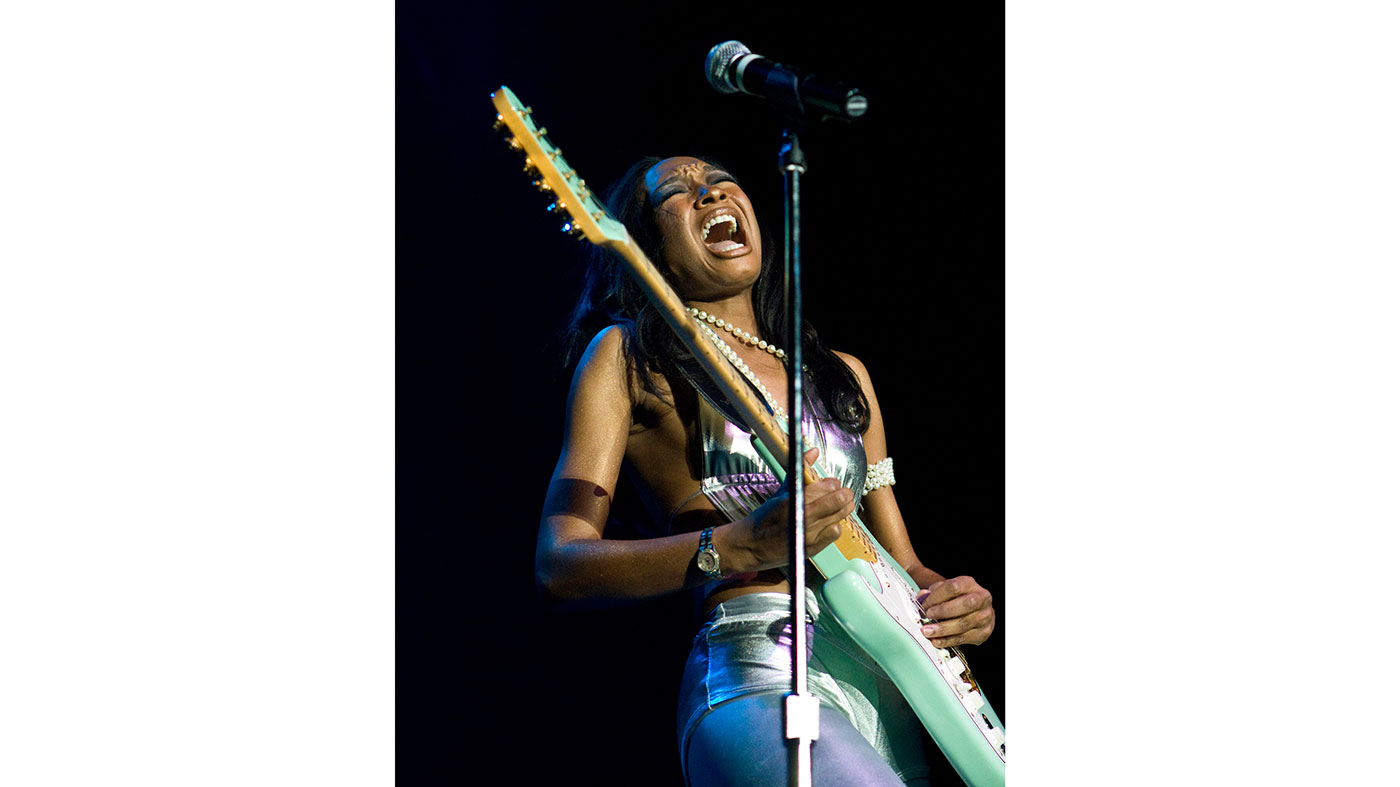
Fifth gear playing
You’ve often cited Jimi, another lefty, as a core influence. 50 years on, why is he still a such a touchstone?
“Freedom. Freedom as a player. And also his tone, phrasing, but I go back to freedom as a lead player… melody, soul. That’s something that you can’t learn, I don’t think, from a school. The players who really hit you in the gut so you remember and you feel it, that is something you cannot teach. I think that is something that you actually have in you.
“Where it’s like your body and your mind are all one with the note and what you’re playing, and it’s coming through you. You’re not even thinking about it anymore. That’s like, ‘fifth gear’, as my brother would say. Fifth-gear playing, that’s what Jimi brings. Every time he gets up to do it, it’s fifth gear. For me, that’s we should aspire to.
“It’s funny, when I heard If 6 Was 9 I felt like, ‘Man, I really want to do this record.’ What’s crazy is that this is 2018, and he did that record a long time ago. Yet, for me, it feels like the times haven’t changed. I don’t want to get political, but when I look at America and I’m seeing what Donald Trump is doing and how he’s treating people… It’s crazy. I was never raised to disrespect people, I don’t do that. So, as a black woman in rock, I started to feel like people were trying to erase me, or replace me. And that’s where this album came from. I felt like this is a personal letter from me, and I’m using my guitar as my weapon to tell you how I feel and give you my perspective, in my shoes.
“For instance, in the middle of the song Better Than You, I sing, ‘Wait in the water’. The reason I wanted to use that is because back in the days of slavery, [escaping] slaves would go into the water to throw the dogs off the scent. I put this in the middle of my record, because I feel like not just for myself, but a lot for women, that a new dawn, a new day is coming because right now we don’t see ourselves represented in an equal situation, period. So that line is just to say: keep doing what you’re doing and wait in the water – meaning that I know a new change is coming for us, for all of us.”
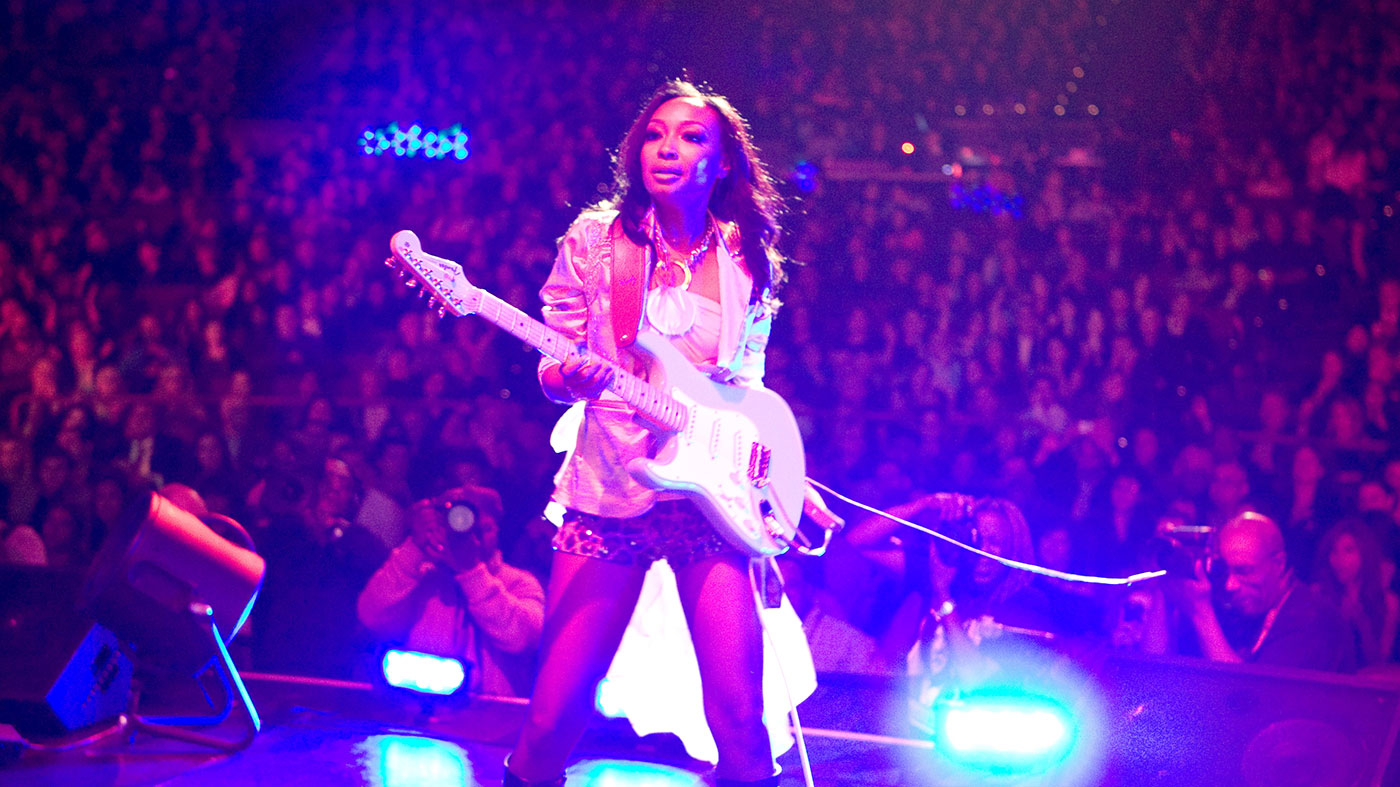
Life, living it...
Being able to tap into the core emotions of a song while performing is massively important, but a lot of people struggle to stay focused on feel and phrasing, due to nerves or excitement. What’s your advice?
When life happens, this is the most incredible thing because these are the elements that really give you the art
“I would say to you to get out of your comfort zone, and do not be afraid to fail. Confidence comes from the ability to have people knock you down. Don’t be afraid to have life happen. When life happens, this is the most incredible thing because these are the elements that really give you the art, that really give you the emotion and the passion that actually comes out.
“Whether that is with a paintbrush, a guitar, or your voice. I would encourage all your readers to look [for emotional touchstones]. Sometimes it’s not even something to do with an instrument, it’s something that happened to you. Look at that one thing and be, like, ‘You know what? I’m going to take all the emotion from this,’ or ‘They made me feel like this,’ and put that inside – as my mom would say – inside the belly of your stomach and just go. That’s the hardest thing in the world, because everybody wants to be accepted and loved, but the person who decides that they’re going to take chance is always going to be the person that realises that on the other side of fear is greatness.”
As Bad As I Want To Be by Malina Moye is out now on Leopard.
Jamie Dickson is Editor-in-Chief of Guitarist magazine, Britain's best-selling and longest-running monthly for guitar players. He started his career at the Daily Telegraph in London, where his first assignment was interviewing blue-eyed soul legend Robert Palmer, going on to become a full-time author on music, writing for benchmark references such as 1001 Albums You Must Hear Before You Die and Dorling Kindersley's How To Play Guitar Step By Step. He joined Guitarist in 2011 and since then it has been his privilege to interview everyone from B.B. King to St. Vincent for Guitarist's readers, while sharing insights into scores of historic guitars, from Rory Gallagher's '61 Strat to the first Martin D-28 ever made.
